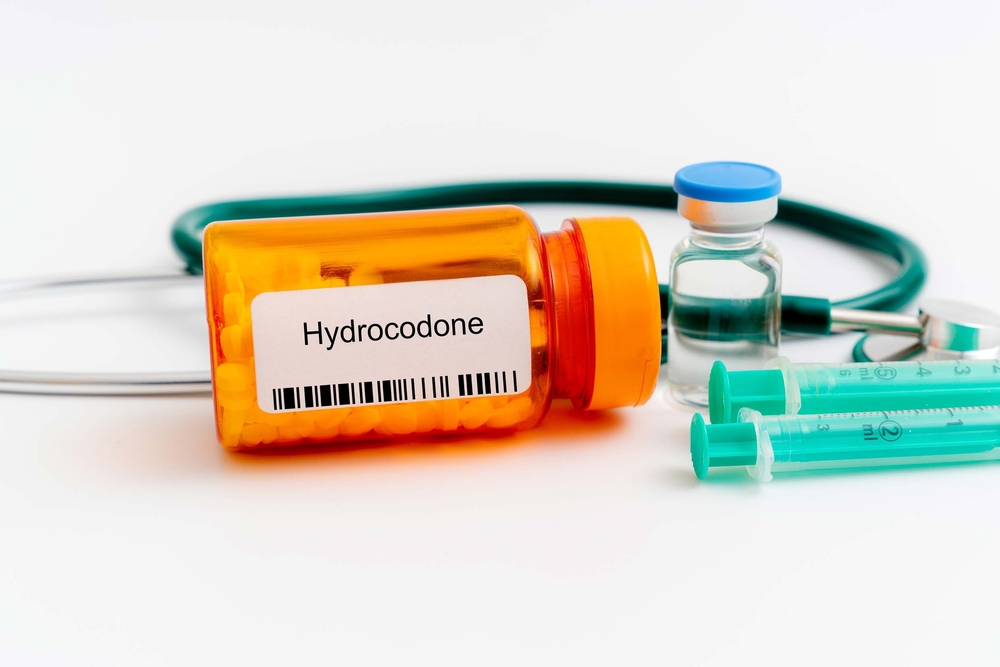Last Updated:
August 19th, 2025
Hydrocodone Rehab Treatment | What to Expect
Hydrocodone addiction isn’t something most people ever see coming. It usually starts with a legitimate prescription for a prescription like Vicodin, but before you know it, you find yourself trapped in a dependent cycle. Hydrocodone might seem safer or more harmless than street drugs, but it can cause untold harm without professional hydrocodone addiction treatment. Fortunately, hydrocodone rehab programmes can help you take back control of this often-hidden but potentially deadly addiction.

What is hydrocodone rehab?
Hydrocodone rehab is a proven treatment programme to help end dependence on the drug and prevent a return to it. The first step in any hydrocodone rehab process is typically a medically supervised hydrocodone detox because suddenly stopping the drug can cause severe reactions called withdrawal. Without medical help during the few weeks that hydrocodone withdrawal lasts, you are at a high risk of relapse and even medical emergencies.
Once you have safely withdrawn, hydrocodone rehab focuses on uncovering the real reasons for your dependency beyond the physical reliance. You may have been prescribed hydrocodone for pain or after dental surgery or may even have started taking it because it took the edge off a stressful life. Whatever the case, therapy will help you map all the causes so you can resolve or manage them without drugs like hydrocodone.
Leaving rehab and returning home, however, isn’t always easy, particularly if you’re heading back into an environment where hydrocodone or similar drugs are still accessible. That’s why good hydrocodone rehab programmes always include structured aftercare. This offers continued counselling, access to support groups, practical relapse-prevention strategies and ongoing medical advice to ensure you remain on track, even when life feels complicated.
Struggling with an addiction? If you are ready to seek help, reach out to us today, and a member of our compassionate team will help you find the best option for starting your recovery journey.
Why is hydrocodone rehab so important?
In the UK, prescription opioids like hydrocodone have increasingly come under scrutiny as more people find themselves dependent without ever realising they’re at risk. While hydrocodone addiction hasn’t yet reached the scale of the opioid crisis seen in the US, there is growing concern in the UK about prescription opioids quietly causing addiction and overdose.
Professional hydrocodone rehab is vital because it helps prevent potentially fatal outcomes. Stopping hydrocodone on your own once physically dependent can be hard and even dangerous, as withdrawal symptoms are difficult to manage alone.
Hydrocodone rehab provides immediate medical care in case of emergency and specialised therapy to untangle the emotional and psychological parts of addiction. This is very important for two main reasons:
- Without undergoing rehab therapy, there is a high chance of unresolved issues flaring up at some point in the future and causing a relapse.
- If you do relapse, there is a high chance of an overdose as you won’t have the same level of tolerance to hydrocodone as before.
Hydrocodone rehab is designed to help you stop taking the drug right now and never feel the need or urge to go back to it.
Private inpatient hydrocodone rehab vs. NHS outpatient hydrocodone rehab
Deciding between outpatient and inpatient hydrocodone rehab depends on your individual needs, your home environment, and how severe your addiction has become. Here’s a simple breakdown to help you make the best choice for you:
|
Inpatient hydrocodone rehab |
Outpatient hydrocodone rehab |
|
| Accommodation | Stay full-time in a supportive, peaceful rehab centre, away from daily stress and difficult people | Stay at home, attending regular sessions locally while still working, going to school or looking after your family. |
| Medical supervision | Continuous professional medical supervision to ensure your safety around the clock. | Regular scheduled medical check-ups as needed but not 24/7. |
| Detox support | Immediate onsite supervised medical detox for maximum safety and comfort. | Detox arranged separately, usually off-site or via local NHS facilities. |
| Therapy intensity | Intensive daily therapy and group support for focused healing. | Regular scheduled therapy sessions to fit around daily commitments. |
| Cost & accessibility | Private treatment so quicker access to treatment. | Typically NHS-funded which is free but may involve waiting lists. |
What to expect in hydrocodone rehab?
When you first enter an inpatient hydrocodone rehab centre, it is normal to feel nervous or even a little scared. But the great thing about rehab is that you will soon see that rehab is designed to put you at ease and make you as comfortable as possible. You will have a private space to relax, rest and recover without worrying. Daily schedules in rehab then typically blend therapy sessions, regular health check-ups and plenty of downtime for reflection and rest.
Talking therapies aren’t usually the only activities in hydrocodone rehab, and there will also likely be calming activities like art therapy, gentle yoga or mindfulness exercises. These help reduce stress, put you in a better mood and reintroduce you to interests and hobbies you’ve missed or never tried. Quiet moments are also built into your day, giving you precious space to reflect on your experiences and the strength you’re gaining day by day.
Every hydrocodone rehab centre has a slightly different approach, atmosphere and amenities. Take the time to explore what’s available so you can find the programme and setting that will best support your recovery journey.

Therapies involved in hydrocodone addiction treatment
A good rehab programme supports you emotionally, mentally and physically through various therapies. Some of the most important to look out for at any prospective hydrocodone rehab centre include:
How to find hydrocodone addiction treatment near me?
If you’re ready to free yourself from hydrocodone, Addiction Helper is here for you. We know exactly how difficult it can feel to take that first step, so our compassionate team will clearly and sensitively guide you towards the right hydrocodone rehab. Reach out today and take back control of your life.
Our compassionate team are ready and available to take your call, and guide you towards lasting the lasting addiction recovery you deserve.
Frequently Asked Questions
(Click here to see works cited)
- Cassidy, Theresa A et al. “Patterns of abuse and routes of administration for immediate-release hydrocodone combination products.” Pharmacoepidemiology and drug safety vol. 26,9 (2017): 1071-1082. doi:10.1002/pds.4249. Accessed 15 January 2025.
- UK Addiction Treatment Centres. “Vicodin addiction | Vicodin abuse signs and symptoms | UKAT.” UK Addiction Treatment Centres, 8 August 2023, https://www.ukat.co.uk/addiction/drug/prescription/opiate/vicodin/. Accessed 15 January 2025.
- UK Rehab. “Vicodin Addiction | Causes, Symptoms and Diagnosis.” UK Rehab, https://www.uk-rehab.com/prescription-drug-addiction/opioid/vicodin/. Accessed 15 January 2025.

